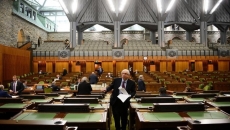Canada clawed back 289,600 jobs in May as provincial governments began easing public health restrictions and businesses reopened, Statistics Canada said Friday.
Still, the unemployment rate in May rose to 13.7 per cent, the highest level in more than four decades of comparable data.
The increase in the unemployment rate, which topped the previous record of 13.1 per cent set in December 1982, came as more people started looking for work.
The monthly labour force survey showed that men gained back more jobs than women in May, resulting in a wider gender gap in employment losses as a result of COVID-19, and that the pandemic continued to disproportionately affect lower-wage workers.
The increase in the number of jobs — which mirrored a similar bump in the U.S. — came after three million jobs were lost over March and April and about 2.5 million more had their hours slashed.
Statistics Canada said the number of people who worked less than half their usual hours fell by 292,000 in May.
Combined with the increase in jobs, Statistics Canada said the country recovered 10.6 per cent of employment losses and absences related to the COVID-19 pandemic.
"The rise in the overall unemployment to 13.7 per cent, the highest on record, shouldn't be taken as a sign of underlying weakness, since it simply represents more out-of-work Canadians stating that they are now looking for work," CIBC senior economist Royce Mendes wrote in a note.
"The surprisingly positive readings on employment paint a more optimistic picture of the early part of the recovery, but there's still a long road back."
Provincially, Quebec led the way, gaining 231,000 jobs as it became one of the first provinces to ease restrictions, doing so just before Statistics Canada collected data the week of May 10.
Combined with people working more hours, the province recovered nearly 30 per cent of what it lost in March and April.
Similarly, all four provinces in Atlantic Canada posted jobs gains in May. Western provinces posted gains except for Saskatchewan, which saw little overall change in employment, Statistics Canada said.
Losses continued in Ontario although at a slower pace than in March and April. The provincial unemployment rate rose to 13.6 per cent in May, up from 11.3 per cent in April.
The total number of unemployed Canadians doubled from February to April, a surge driven by temporary layoffs that the vast majority of workers expected to last less than six months.
At the same time, there was a spike in the number of people who wanted to work but weren't actively looking for a job, likely because the economic shutdown has limited job opportunities. People not actively seeking work aren't counted in unemployment figures.
The unemployment rate for May would have been 19.6 per cent had the report counted among the unemployed those who stopped looking for work — largely unchanged since April.
TD senior economist Brian DePratto noted that close to 90 per cent of those who lost work over March and April are still sitting on the sidelines.
Lower-wage workers were among the first and hardest hit during the shutdown, largely because they worked in industries like retail, restaurants or hotels that closed early in the pandemic.
Statistics Canada said lower-wage workers recovered just over one-tenth of the losses they experienced in March and April. But they continued to have a higher share of people working less than half of their usual hours.
The number of jobs men gained in May outpaced gains by women, who had seen significant job losses early on in the pandemic. Women with children under age six also saw slower job gains than those with older children.
Rebounds were also weak for students and recent immigrants.
"Women, low-paid workers, and racialized workers continue to struggle disproportionately," said Hassan Yussuff, president of the Canadian Labour Congress.
"While women and youth are re-entering the job market, job offers continue to be scarce."






